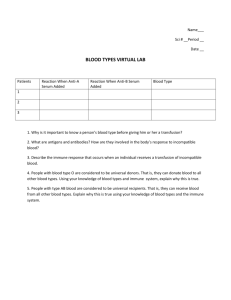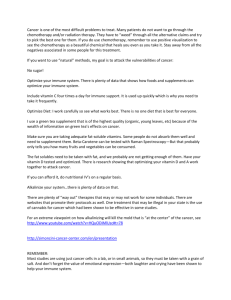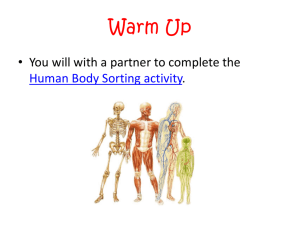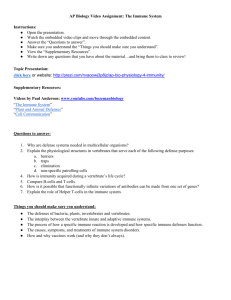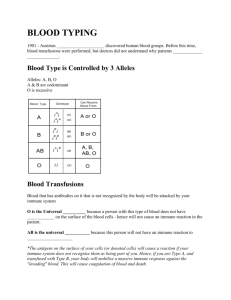Aim_3
advertisement
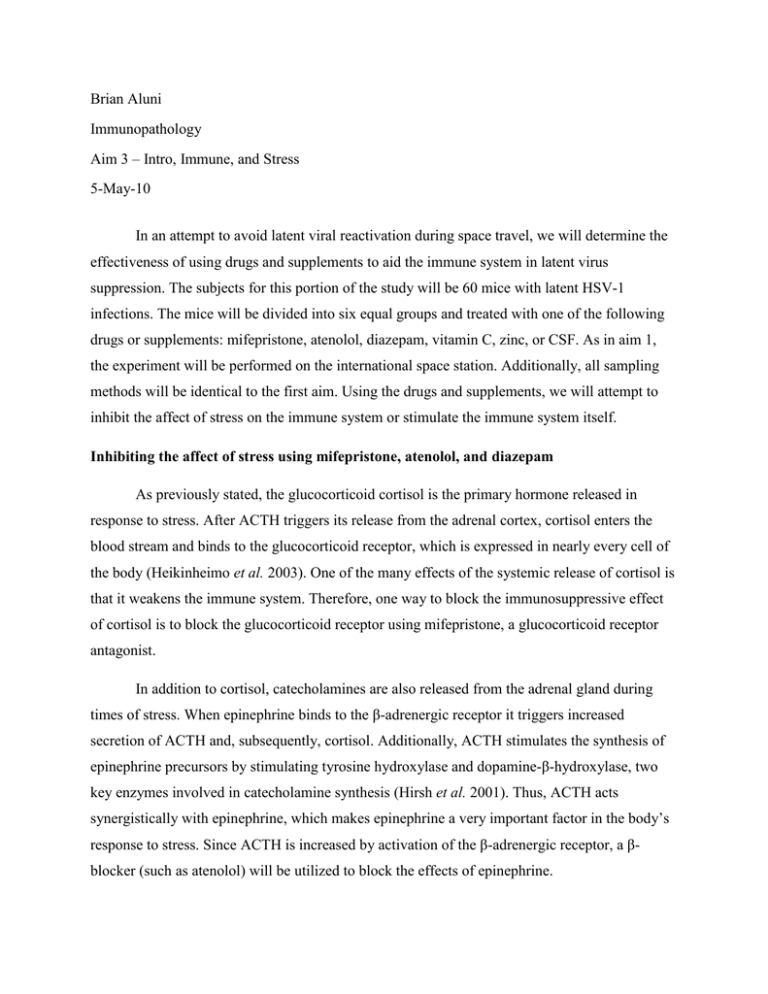
Brian Aluni Immunopathology Aim 3 – Intro, Immune, and Stress 5-May-10 In an attempt to avoid latent viral reactivation during space travel, we will determine the effectiveness of using drugs and supplements to aid the immune system in latent virus suppression. The subjects for this portion of the study will be 60 mice with latent HSV-1 infections. The mice will be divided into six equal groups and treated with one of the following drugs or supplements: mifepristone, atenolol, diazepam, vitamin C, zinc, or CSF. As in aim 1, the experiment will be performed on the international space station. Additionally, all sampling methods will be identical to the first aim. Using the drugs and supplements, we will attempt to inhibit the affect of stress on the immune system or stimulate the immune system itself. Inhibiting the affect of stress using mifepristone, atenolol, and diazepam As previously stated, the glucocorticoid cortisol is the primary hormone released in response to stress. After ACTH triggers its release from the adrenal cortex, cortisol enters the blood stream and binds to the glucocorticoid receptor, which is expressed in nearly every cell of the body (Heikinheimo et al. 2003). One of the many effects of the systemic release of cortisol is that it weakens the immune system. Therefore, one way to block the immunosuppressive effect of cortisol is to block the glucocorticoid receptor using mifepristone, a glucocorticoid receptor antagonist. In addition to cortisol, catecholamines are also released from the adrenal gland during times of stress. When epinephrine binds to the β-adrenergic receptor it triggers increased secretion of ACTH and, subsequently, cortisol. Additionally, ACTH stimulates the synthesis of epinephrine precursors by stimulating tyrosine hydroxylase and dopamine-β-hydroxylase, two key enzymes involved in catecholamine synthesis (Hirsh et al. 2001). Thus, ACTH acts synergistically with epinephrine, which makes epinephrine a very important factor in the body’s response to stress. Since ACTH is increased by activation of the β-adrenergic receptor, a βblocker (such as atenolol) will be utilized to block the effects of epinephrine. Another option is to avoid cortisol and catecholamine secretion through the use of anxiolytic drugs. Benzodiazepines are commonly prescribed for short-term relief of severe anxiety (Atack, 2005). In this study, the symptoms of anxiety are induced by physical and mental stressors. Treatment with a long-acting benzodiazepine is believed to disrupt the psychological pathway which ultimately leads to cortisol and catecholamine secretion. Since diazepam has the longest half-life of all benzodiazepines (Mandrioli et al. 2008), it would be ideal for the treatment of long-term stress-induced anxiety while in space. Stimulating the immune system using vitamin C, zinc, and CSF Another way to protect against latent virus activation is to stimulate immune system function through the use of dietary supplements. Although the research behind dietary supplements is not as through as in pharmaceutical research, there are some vitamins and minerals that have been directly linked to immune function. Recent studies have shown that vitamin C increases the activation of T cells and NK cells (Ströhle and Hahn, 2009). Vitamin C may also activate neutrophils, the ‘first-responders’ to infection. Although vitamins are most often credited for mediating immune function, minerals are also essential to proper immune function. As with vitamins C, zinc has been shown to effect T cell and NK cell populations (Rink and Gabriel, 2000). Zinc deficiencies cause an imbalance in the TH1:TH2 cell ratio. The production of IFN-γ (TH1) is decreased, whereas the production of IL-4 (TH2) stays constant (Prasad, 2008). Furthermore, zinc deficiency decreases NK cell lytic activity and causes a decrease in CD8+ T cells. Since vitamin C and zinc have been shown to be necessary components of proper immune function on earth, it is hypothesized that they would also be an effective in boosting the immune system during space flight. In addition to pharmaceuticals and dietary supplements, biological therapy using colonystimulating factors (CSFs) may be utilized to boost the immune system. CSFs are given to immune-compromised patients to stimulate stem cells within the bone marrow to produce more blood cells (Vora et al. 2008). This causes the bone marrow stem cells to produce white blood cells. CSFs are usually given to cancer patients during chemotherapy to help boost the immune system. This suggests that CSFs would also be an effective in boosting the immune system during space flight. References: Heikinheimo O, Kekkonen R, Lahteenmaki P. The pharmacokinetics of mifepristone in humans reveal insights into differential mechanisms of antiprogestin action. Contraception 68 (6): 421–426, 2003. Hirsh J, Dalen JE, Anderson DR, Poller L, Bussey H, Ansell J, Deykin D. Oral Anticoagulants: Mechanism of Action, Clinical Effectiveness, and Optimal Therapeutic Range. Chest 119: 8–21, 2001. Mandrioli R, Mercolini L, Raggi MA. Benzodiazepine metabolism: an analytical perspective. Curr Drug Metab 9 (8): 827–844, 2008. Atack JR. The benzodiazepine binding site of GABA(A) receptors as a target for the development of novel anxiolytics. Expert Opin Investig Drugs 14 (5): 601-618, 2005. Ströhle A, Hahn A. Vitamin C and immune function. Medizinische Monatsschrift fur Pharmazeuten 32 (2): 49–54, 2009. Rink L, Gabriel P. Zinc and the immune system. Proc Nutr Soc 59 (4): 541, 2000. Prasad AS. Zinc in human health: effect of zinc on immune cells. Mol Med 14 (5-6): 353, 2008. Vora AJ, Toh CH, Peel J, Greaves M. Use of granulocyte colony-stimulating factor (G-CSF) for mobilizing peripheral blood stem cells: risk of mobilizing clonal myeloma cells in patients with bone marrow infiltration. British Journal of Haematology. 86 (1): 180-182, 2008.


